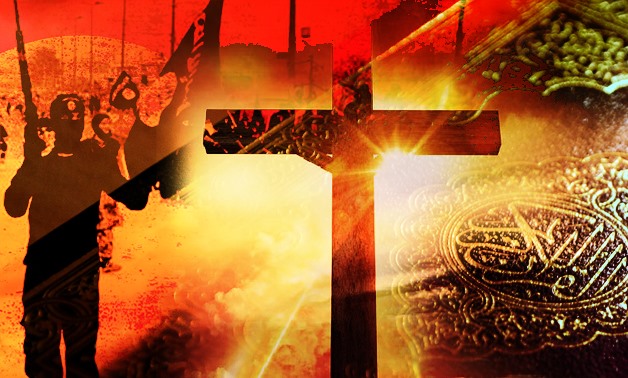
"Online atheistic content is reinforced by the extremist actions of Islamist groups," Khaled Salah, Youm7 editor-in-chief – Photo compiled by Egypt Today
CAIRO – 20 January 2018: The growing number of views on YouTube videos that cast doubts on religions in general, and on Islam in particular, proves that atheism is no longer a passing storm.
The dangers of terrorism are known, but not many know that atheism and terror are equally destructive. Atheism, also, weakens one's identity and calls into questions established beliefs in history, canons, religious symbols, the Prophet's companions and followers, and ultimately leads to the collapse of the foundations of entire nations and of their sacred beliefs.
It is not just the number of views on YouTube videos that indicate how fast atheism and the waves of skepticism are spreading. The level of interaction, comments on the videos, most of which support the content of the clips, all reveal that such ideas are already widespread.
I attempted, for instance, to examine the reactions of young men and women to the recent crisis of Jerusalem following Trump's decision to move the Israeli embassy thereto. No sooner had I written the words Jerusalem and Al-Aqsa Mosque than I found tens of videos questioning the holiness of the city in the first place, and which show contempt for its sacredness in the Quran and
Hadith (Prophet Mohamed's sayings).
Those videos went viral during the recent Jerusalem issue, and those young people absorbed the ideas of atheist intellectuals, politicians and activists who believe that Jerusalem was never a fundamental element in Islamic thought since the time of Prophet Mohamed.
Indeed, skepticism in Isra and Mi'raj (Prophet Mohamed's journey from Mecca to Jerusalem and his ascension to the seventh heaven) and in Jerusalem's significance to Muslims is coming from inside. Some even claim that Jerusalem's issue was nothing but a card played by late Egyptian President Gamal Abdel Nasser in the Arab-Israeli conflict, and by Islamic groups before and after him to perpetuate the perception of Arab governments which overlook the Jerusalem issue as faithless and led by "infidels."
Said videos have millions of viewers, and once you click on any of them it takes you to tens of related videos with similar content, and these in turn take you to a bunch of other videos which use this skeptical argument as a tool to question the Quran itself and on Hadith.
The bring into questions verses and sayings that speak about the change of
qiblah (the direction in which Muslims pray, which was towards Al-Aqsa Mosque in the early days of Islam and was later changed towards Kaaba in Mecca) or the ones which tell the details of the Isra and Mi'raj journey and Prophet Mohamed's prayer in Al-Aqsa Mosque with all the other prophets.
In short, if you search the word Jerusalem on YouTube, you will be taken on an endless ride of skepticism; you will end up having doubts about Jerusalem's place in Islam, its Arab identity, and then about the verses related to the first of the two qiblahs, Al-Aqsa Mosque.
Naturally, a systematic questioning of the veracity, interpretation, and the possible politicization of religious texts. I was only trying to examine young people's reactions towards the Jerusalem issue, but what I found was a vortex of skepticism, existentialism and atheism through videos that alter basic beliefs.
Different parties are involved and are playing a dangerously critical part in the process. The issue is indeed a dangerous one because this atheistic content and these skeptical videos are reinforced by the extremist actions of Islamist groups such as the self-proclaimed Islamic State, the Muslim Brotherhood, Hezbollah and many others. As a result of their fanatic ideas that turned Islam into a killing parade for the benefit of their own political interests, a anti-religion stream was born, thanks to the violent and belligerent tendencies of those so-called Islamists.
And I repeat, the issue is very serious, and it is one that needs research to remedy the side effects of the extremist ideology of the terrorism enterprise. Terror helps spread atheism and the proliferation of the atheistic wave in cyberspace, an out of reach platform. This issue will be in our agenda of priorities in the coming period.
Khaled Salah is the editor-in-chief and father of Egyptian influential daily Youm7; the paper was twice selected by Forbes Middle East as having the most effective news website in the Middle East.
 Khaled Salah, editor-in-chief of influential daily Youm7
Khaled Salah, editor-in-chief of influential daily Youm7


Comments
Leave a Comment